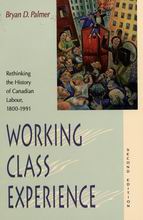
Working Class Experience
Rethinking the History of Canadian Labour, 1800-1991
Palmer, Bryan D.
Publisher: McClelland & Stewart, Toronto, Canada
Year First Published: 1983
Year Published: 1992
Pages: 455pp ISBN: 0-7710-6945-6
Resource Type: Book
Cx Number: CX18649
From nineteenth-century tavern life to late twentieth-century cinema, from rough canallers and the first stirrings of craft unionism to contemporary public-sector strikes, this books provides a sweeping interpretive study of the history of the Canadian working class since 1800.
Abstract:
Working Class Experience: Rethinking the History of Canadian Labour, 1800-1991 is a study of the history of the Canadian working class since 1800. Divided into seven detailed chapters, "the book traces the class struggles, political realignments, and cultural formations that evolved in the midst of economic and social transformation" and "follows Canadian workers as they travelled common routes of resistance and accommodation." It is a thorough study beginning with the movement of workers, from land to factories and workplaces of Canada's industrial revolution. The book is a revised and updated edition of the author's earlier work, Working-Class Experience: The Rise and Reconstitution of Canadian Labour, 1800-1980. The new edition contains a chapter on the contemporary period, looks more closely at the use and abuse of law by the state, further analyses the role of gender in working-class relations and considers political and economic issues central to working-class well being.
Bryan D. Palmer is the author of numerous books and is a Professor of History at Queen's University. He is also the president of the Canadian Committee on Labour History and works closely with the journal Labour/Le Travail.
[Abstract by Nabeeha Chaudhary]
Table of Contents
Preface
1. Producing Classes, Paternalist Authority, 1800-1850
i) The Social Formation
ii) Paternalism
iii) Material Experiences: Divergent / Convergent
iv) The Irish and Others: Some Quantities
v) Apprenticeship
vi) The Respectable
vii) The Rough
viii) Crime, Anti-Crime, and Class: The Law and the Producers
ix) Rough Justice
x) The Insurrectionary Moment
xi) Gender, Class, and the Paternal Order
xii) Producing Classes and Paternalist Authority - Accommodation and Resistance
2. Class Differentiation and Antagonism, 1850-1880
i) The Social Formation
ii) An Insurrection of Labour
iii) Unionism: Local and International
iv) Associational Life
v) Families
vi) Tavern Life: The World of Joe Beef's Canteen
vii) The Nine-Hour Pioneers
viii) Law and Labour: Establishing Limits
ix) The 1870s: Beginnings and an End
3. The Consolidation of Working-Class Opposition, 1880-1895
i) The Social Formation
ii) Knights and Workmen
iii) A Movement Culture
iv) Brainworkers
v) Women
vi) Politics
vii) Strikes
viii) On the Margins of the Movement
ix) The Close of a Century
4. The Remaking of the Working Class and Its Oppositions, 1895-1920
i) The Social Formation
ii) Material Life
iii) Internationalism
iv) Workplace Confrontation
v) The Politics of Dissent
vi) Regionalism: Radicalism / Religion
vii) Gendered Radicalism
viii) The War for Democracy
ix) General Strike
x) State and Class: Law and the Industrial Order
xi) Understanding Working-Class Oppositions and 1919
5. Dissolution and Reconstitution, 1920-1940
i) The Social Formation
ii) Labour Defeated
iii) Blood, Guts, and Culture on the Coal
iv) Communism
v) The Theatre of Mass Culture: The First Act
vi) Women of the New Day
vii) Working Against Not Working
viii) Reformism
ix) Industrial Unionism
x) Agitprop / Profit
xi) State Power in the Service of Class Interest
xii) The Pre-World War Two Context: Labour on the Defensive
6. Class, Culture, and Movement, 1940-1975
i) The Social Formation
ii) Militancy, Legitimation, and the Arrival of Industrial Legality
iii) Unionism
iv) Labour's Cold War
v) Coming Together
vi) The Rise and Fall of the Co-operative Commonwealth Federation
vii) Immigrants and Incomes
viii) Class and Nation: Quebec
ix) Youth, Popular Culture, and English-Canadian Nationalism
x) Women: At Home and Away
xi) The NDP: A Legacy of Class Ambivalence
xii) Fordism and the Canadian Working Class, 1940-1975
7. Hard Times: Economic Downturn, the State, and Class Struggle, 1975-1991
i) The Social Formation
ii) Cannibalizing the Clerks: Public-Sector Workers and State Attack
iii) A Tale of Two Provinces: The Assault on the Public Sector in Quebec and British Columbia
iv) A Tale of Two Bureaucracies: The Good Cop / Bad Cop Mythology of Trade Union Leadership
v) Slow-cialisms in One Province: Labour and the New Democratic Party in Hard Times
vi) Mass Culture: Spectacle and Hard Times
vii) Stabbing Back / Back-Stabbing
viii) The Good, the Bad, and the Ugly: The Working Class in a Time of Permanent Crisis
Bibliography
Index
Subject Headings


